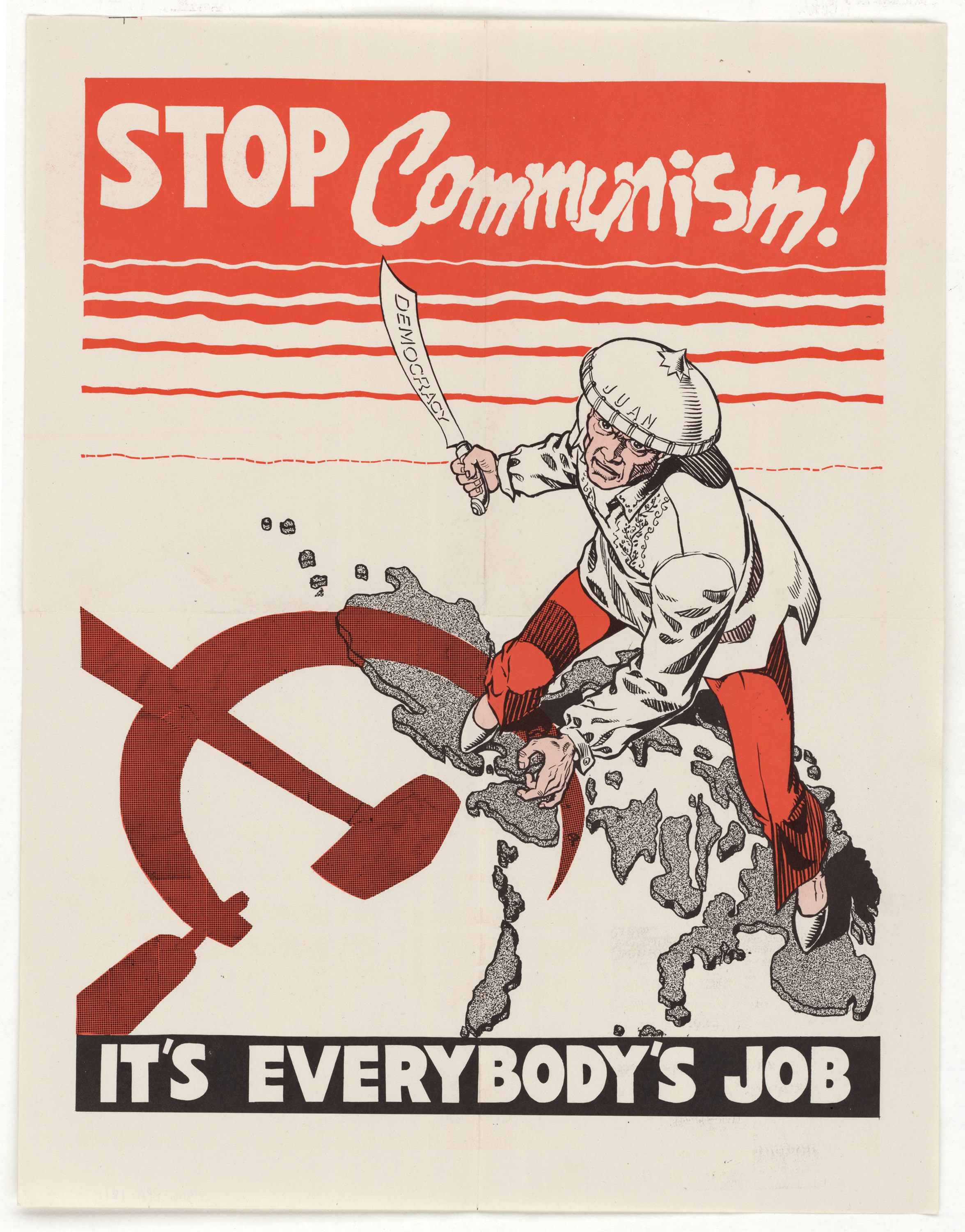m (Added an image, enhanced lede) Tag: Visual edit |
(Improved lede, added section for history) Tag: Visual edit |
||
| Line 1: | Line 1: | ||
'''Anti-communism''' is a [[reactionary]] political ideology which opposes [[communism]], usually promoted by [[capitalism|capitalist]] propagandists who recognize communism as a threat to their power. | '''Anti-communism''' is a [[reactionary]] political ideology which opposes [[communism]], usually promoted by [[capitalism|capitalist]] propagandists who recognize communism as a threat to their power. | ||
[[File:Stop Communism propaganda poster.jpg|thumb|255x255px|Anti-communist propaganda poster from the 1950's depicting the "sword of democracy" fighting against a hammer and sickle in the Philippines]] | [[File:Stop Communism propaganda poster.jpg|thumb|255x255px|Anti-communist propaganda poster from the 1950's depicting the "sword of democracy" fighting against a hammer and sickle in the Philippines]] | ||
While organized anti-communism emerged in response to the [[October Revolution|Russian Revolution]] of 1917, bourgeois repression | While organized anti-communism emerged in response to the [[October Revolution|Russian Revolution]] of 1917, bourgeois repression of working class movements was already enforced before that, notably in the repression against the [[Paris Commune]].<ref name=":0">Giovannini, Fabio (2004). ''Breve storia dell'anticomunismo [Brief history of anti-communism].'' Roma: Datanews Editrice. [http://libgen.rs/book/index.php?md5=6B0C93DFC9C70FADA5C6D9F07B3C3FA2 Spanish translation available in Library Genesis]</ref> | ||
In the first paragraph of his 1848 ''[[Manifesto of the communist party]]'', [[Karl Marx]] references anti-communism already existent in his time: ''“All the powers of old Europe have entered into a holy alliance to exorcise [the spectre of communism]: Pope and Tsar, Metternich and Guizot, French Radicals and German police-spies.”''<ref>Karl Marx. ''Manifesto of the communist party.'' [[Library:Manifesto of the communist party|Library link]]</ref> | |||
== History == | |||
=== Origins of anti-communism === | |||
Bourgeois repression of communism can be traced as early as 1796,<ref name=":0" /> when the newly installed French bourgeois government ordered the arrest and execution of the [[Utopian socialism|utopian socialist]] François-Noël Babeuf, in a crackdown against the "Conspiracy of the Equals", a group of Jacobin revolutionaries who advocated for the abolition of [[private property]]. | |||
Auguste Blanqui, another utopian socialist, was frequently persecuted and arrested during his lifetime.<ref name=":0" /> | |||
== References == | == References == | ||
Revision as of 03:04, 25 May 2021
Anti-communism is a reactionary political ideology which opposes communism, usually promoted by capitalist propagandists who recognize communism as a threat to their power.

While organized anti-communism emerged in response to the Russian Revolution of 1917, bourgeois repression of working class movements was already enforced before that, notably in the repression against the Paris Commune.[1]
In the first paragraph of his 1848 Manifesto of the communist party, Karl Marx references anti-communism already existent in his time: “All the powers of old Europe have entered into a holy alliance to exorcise [the spectre of communism]: Pope and Tsar, Metternich and Guizot, French Radicals and German police-spies.”[2]
History
Origins of anti-communism
Bourgeois repression of communism can be traced as early as 1796,[1] when the newly installed French bourgeois government ordered the arrest and execution of the utopian socialist François-Noël Babeuf, in a crackdown against the "Conspiracy of the Equals", a group of Jacobin revolutionaries who advocated for the abolition of private property.
Auguste Blanqui, another utopian socialist, was frequently persecuted and arrested during his lifetime.[1]
References
- ↑ 1.0 1.1 1.2 Giovannini, Fabio (2004). Breve storia dell'anticomunismo [Brief history of anti-communism]. Roma: Datanews Editrice. Spanish translation available in Library Genesis
- ↑ Karl Marx. Manifesto of the communist party. Library link